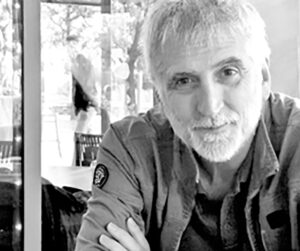Abstract
On February 28th, the launch event for the Catalan Association for Science and Technology Studies (STS-CAT) took place in Barcelona. During the first session, Prof. Wiebe Bijker, as the keynote speaker, delivered a talk on the current social relevance and usefulness of STS, with a particular focus on recent international political developments. The second session featured a roundtable discussion where various STS researchers shared their experiences applying STS in non-academic fields, such as science policy, disaster management, technology regulation, and social activism. Finally, Dr. Miquel Domènech, a founding member of STS-CAT, concluded the event with a presentation outlining the association’s core objectives and the context of its creation.
On February 28, 2025, the launch event of the Catalan Association for Science and Technology Studies (STS-CAT) took place at the CSIC Researchers’ Residence in Barcelona. The event, which was held in person and open to the public, brought together more than 80 attendees, far exceeding our initial expectations (as the initial driving group for establishing the association was made of 20 scholars). Virtually the entire Catalan STS community was present. Among the attendees were doctoral students, researchers, and professors from the Universitat Autònoma de Barcelona, the Universitat Oberta de Catalunya, the Universitat de Barcelona, and the CSIC. We were also joined by some of our colleagues and friends from other parts of Spain.
In addition to STS researchers, the event welcomed academics from related fields such as the history of science, as well as researchers from various scientific and technological disciplines, mainly in the areas of artificial intelligence and biomedicine. Notably, representatives and members of several institutions involved in the management and promotion of science and technology in Catalonia were also in attendance, including the Catalan Foundation for Research and Innovation (FCRI), the Scientific Advisory Council of the Barcelona City Council, the Catalan Association for Artificial Intelligence, and the Catalan Association for Science Communication.
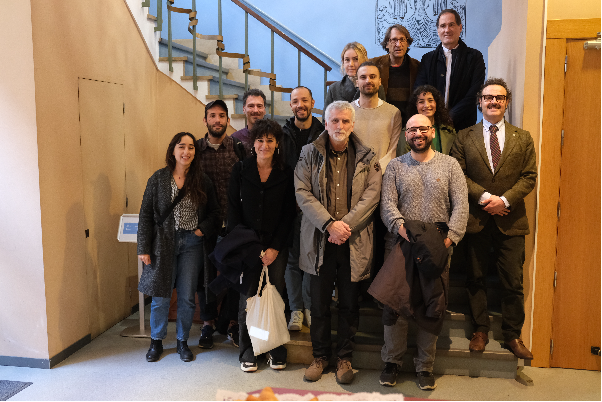
The event was kindly supported by institutions such as EASST, CSIC (Spanish National Research Council), UAB (Universitat Autònoma de Barcelona), and UOC (Universitat Oberta de Catalunya). It served as an introduction to the new association in Catalonia. Given the high attendance—not only from the academic STS field but also from members of various civil institutions and researchers from a wide range of disciplines—we can consider the event a resounding success. It demonstrated the significant social interest in STS topics, as well as their approaches and perspectives.
The event opened with an inaugural lecture by Wiebe E. Bijker, Professor Emeritus at Maastricht University (the Netherlands), introduced by Eduard Aibar (UOC). Prof. Bijker has undoubtedly been one of the most influential scholars in the development and consolidation of STS since its early days and is one of the leading proponents of what became known as the “technological turn” in the field, during the late 80s and early 90s.
The presentation by Wiebe Bijker emphasized the growing necessity of STS in today’s world. He highlighted pressing global challenges such as climate change, ecological sustainability, and the impact of populism and misinformation on democracy. He argued that STS provides critical tools to analyze and address these issues by examining the social and cultural roots of scientific authority and the problematic governance of emerging technologies.
Bijker outlined the evolution of STS as an academic field, showing how it has expanded from scholarly research into broader societal engagement. He stressed the need to rethink research and engagement agendas, emphasizing what he understands as STS core skills. First of all, interdisciplinarity, i.e., integrating social sciences and humanities (SSH) with science and engineering, and transdisciplinarity, bridging scientific knowledge with non-scientific systems. Then interactional expertise: allowing scholars to engage effectively with scientific and engineering communities. Additionally, STS approaches operate across different scales (micro, meso, and macro) to understand complex sociotechnical systems. Another key skill is combining research with public engagement, enabling scholars to influence policy and politics without compromising academic rigor. Finally, Bijker emphasized the role of STS scholars as public intellectuals, fostering democratic participation and contributing to a more inclusive and socially responsible governance of science and technology.
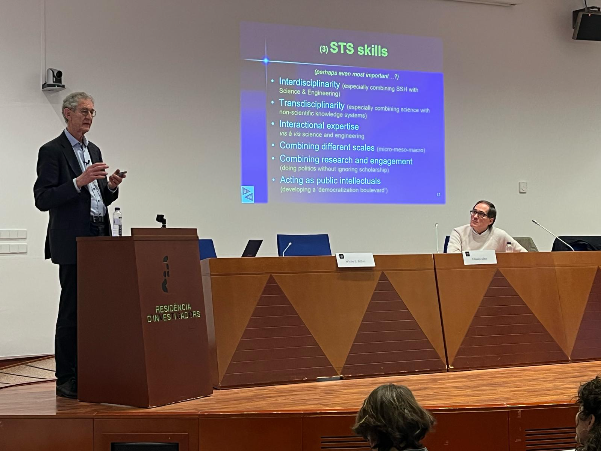
The presentation also explored the role of STS in governance and policy matters, advocating for a more nuanced understanding of policy making. Instead of the traditional view that separates scientific facts from political values, Bijker argued for a model where science and policy are deeply interconnected. He discussed the role of STS in initiatives such as the G20 Chief Science Advisers’ Roundtable and efforts to promote diversity, equity, inclusion, and accessibility in science and technology.
Finally, Bijker concluded with a call to action for STS-CAT, encouraging the association to strengthen collaboration among scholars and actively engage in public debates. He emphasized the importance of acting as public intellectuals, using STS knowledge and skills to address contemporary societal challenges. By building a strong STS community, STS-CAT can contribute to democratic governance, technological development, and social justice in Catalonia and beyond.
After Bijker’s insightful presentation, during the break between sips of coffee and pastries, we made a small yet meaningful change: adjusting the lettering and opting for a smaller typeface for “sts”1. Our association emerges within a situated set of elements and circumstances of the local Catalan ecosystem –including a highly discipline-oriented academic landscape and the absence of a strong institutional tradition in STS– coexisting in constant dialogue with the intellectual, social, and political environment that surrounds it.
It was within this context that the round table, “STS in Action”, unfolded. This engaging discussion brought together distinguished STS scholars, including Blanca Callen (UAB), Israel Rodríguez-Giralt (UOC), Ismael Ràfols (Ingenio CSIC-UPV & Univ Leiden), and Vincenzo Pavone (IPP-CSIC), under the moderation of Núria Vallès-Peris (IIIA-CSIC). Their diverse perspectives enriched the conversation, offering a multifaceted exploration of the ways in which science, technology, and society interact.
The discussion delved into pressing and relevant issues, such as activism, scientific evaluation policies, assisted reproduction programs, and disaster management. Each participant contributed unique insights drawn from their own experiences, highlighting how the relationship between research and participation extends well beyond the confines of strictly the academic sphere. The conversation with the audience showed how this relationship is a process constantly “done and to be done” (Catoriadis, 1998), in which the orchestration of gazes of various stakeholders, meanings and knowledge is marked by a delicate balance of tensions and negotiations.
To close the event, Miquel Domènech (UAB) delivered the final remarks. In his intervention, he reflected on the importance and necessity of establishing STS-CAT as a formal association. In that spirit, he elaborated on the motivations behind the creation of STS-CAT. As he explained, the association emerges not from institutional mandates or formal frameworks but from a need deeply rooted in local realities: the need to give visibility to a field of knowledge that, despite its growing relevance, remains fragmented and often under-recognized in the Catalan academic and social landscape. He lamented the absence of dedicated departments or institutional spaces for STS in Catalan universities and research centers, which has led to a situation where scholars and practitioners often work in isolation or at the margins of more established disciplines.
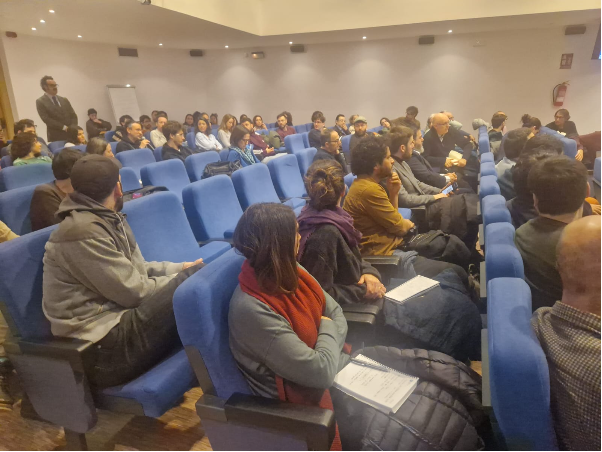
He laid out several foundational goals for STS-CAT. First, to make STS more visible in Catalonia—not only as an academic field but as a space for public debate, intervention, and critical engagement. He stressed the importance of supporting the development of academic careers in this area, especially for younger researchers navigating precarious conditions. STS-CAT, in this sense, should function as both a scholarly network and a support structure for them.
Another key aim, as Domènech emphasized, is to strengthen the ties between existing research groups and individual scholars in Catalonia working on STS-related topics. By fostering a more cohesive and interconnected community, the association can serve as a platform for sharing knowledge, methodologies, and resources. He underlined the importance of interdisciplinarity—STS as a field that thrives precisely because it draws from various disciplinary traditions. STS-CAT must embrace that diversity and help bridge the gaps between these different academic cultures.
Domènech also spoke about the role of STS-CAT beyond academia. One of the ambitions of the association is to position itself as a reference for society at large—a space people can turn to when faced with complex challenges related to science and technology. Whether in responding to public controversies, providing advice in policy contexts, or opening spaces for civic participation, STS-CAT should be present, engaged, and proactive. He advocated for the association to contribute to the democratic governance of science and technology in Catalonia, recognizing that these domains are never neutral or purely technical but always political, contested, and deeply embedded in social life.
In closing, Domènech reminded the audience that STS-CAT is a project under construction. Its future depends on the collective energy, commitment, and creativity of those involved. He encouraged everyone present to continue participating, collaborating, and shaping the association as an open, plural, and dynamic space.
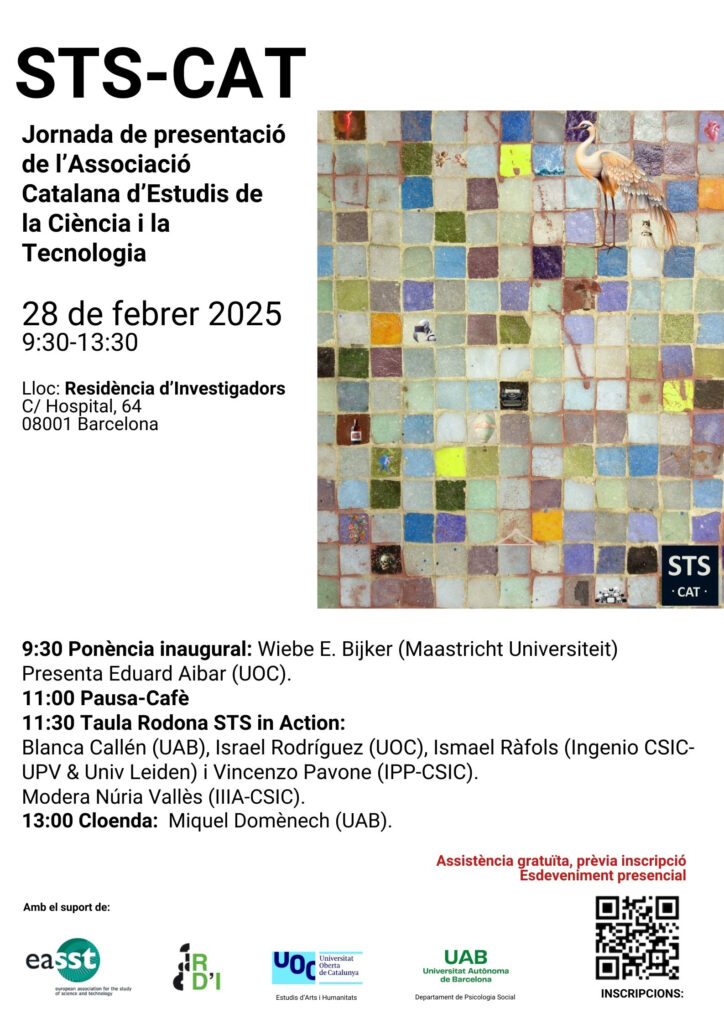
Footnotes
- The distinction between larger and small letters is taken from the proposal of anthropologist Aihwa Ong (2007), to refer to the idea that global phenomena also have a translation in our small everyday practices and experiences. ↩︎
References
Castoriadis, C. (1997). Hecho y por hacer. Pensar la imaginación. Madrid: Enclave de libros.
Ong, A. (2007). Neoliberalism as a mobile technology. Transactions of the Institute of British Geographers, 32(1), 3–8. https://doi.org/10.1111/j.1475-5661.2007.00234.x
Author biographies
Eduard Aibar is professor of science and technology studies at the Department of Arts and Humanities at the Universitat Oberta de Catalunya (UOC). He has served as Vice President for Research and director of the Internet Interdisciplinary Institute at the UOC. He teaches STS in different undergraduate and postgraduate degrees and is now conducting research on scientific fraud and misconduct. He is the current president of STS-CAT.
Miquel Domènech is a Senior Lecturer in Social Psychology at the Universitat Autònoma de Barcelona (UAB). He directs the Barcelona Science and Technology Studies Group (STS-b) and is a member of the European Association for the Study of Science and Technology (EASST), where he has served on the council. His research activity revolves around three core interests: scrutinizing the societal implications of care technologies, exploring citizen involvement in technoscientific matters, and traversing the intricate realm of ethical dilemmas in the field of technology.
Núria Vallès-Peris explores the social, political, and ethical controversies surrounding robotics and artificial intelligence in healthcare and education, integrating the study of imaginaries and infrastructures. She is a tenured scientist at the Artificial Intelligence Research Institute of the Spanish National Research Council (IIIA-CSIC), member of the STS-b and an adjunct professor in the Department of Social Psychology at the UAB. She is the current vice-president of STS-CAT.


